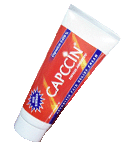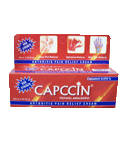| CAPCCIN |
| |
Capsaicin, extracted from red chilli is a potent topical analgesic. Capsaicin reduces Substance P that is found in nerve endings and is involved in transmission of pain.
| Ingredients |
Natural Capsaicin (USP 27) 0.075
% w/w
Cream base: Q.S. |
| Other ingredients |
Benzyl alcohol, Cetyl alcohol, DM water,
Emulsifying wax, Glycerine, Isopropyl myristate, Polysorbate 80,
Propylene glycol, Stearic acid, White petroleum jelly. |
| Description |
Helps relieve pain and inflammation; can be useful in arthritic and neuropathic pain. |
| Application |
Relieves Arthritic pain |
| Application & Precautions |
Apply a small amount of cream to the affected area initially and increase the amount gradually. Spread the cream around the painful area and massage it into the skin until no residue remains. Apply 2 - 3 times a day. You should continue treatment for atleast two weeks even it may not appear to be working initially. Maximum benefit usually occurs about one month after treatment commences. The pain remission you get after usage of Capsaicin is much longer than conventional analgesic gels.
Do not apply on sensitive areas such as eyes, groins.
If applied accidentally, wash with plenty of cool water. Wash hands immediately after use and keep hands well away from eyes. Do not apply on cracked/broken skin. Do not take a hot bath / shower just before or after application - it can make the stinging worse.
|
| Adverse Effects |
Some patients may notice a tingling/burning feeling in the applied area but gradually reduces or stops as the treatment continues. |
| Safety |
Exposure to capsaicin initially leads to the sensation of pain but upon repeated application, it leads to the desensitization to painful stimuli. |
| Packing |
57 gm Seamless tube |
FOR EXTERNAL USE ONLY |
|


|
| |
References :
- Recommendation for medical management of Osteoarthritis
of the hip and knee;
American College of Rheumatology Sub Committee on Osteoarthritis guidelines; 2000 update.
- Systematic review of topical Capsaicin for the treatment of
chronic pain, Lorna Mason et al, BMJ 19 March 2004.
- Pharmacotherapy of Osteoarthritis, Stitik TP, Altschuler E,
Foye PM: Am J Phys Med Rehabil 2006; 85 (Suppl) : S15 -S28.
- Rheumatology and musculoskeletal medicine; Graham Davenport,
British Journal of General Practice, June 2004.
- Review : A critical appraisal of clinical practice guidelines
for the treatment of lower-limb osteoarthritis: James N Pencharz
et al, Arthritis Res 2002, 4:36-44.
- Medical Management of Osteoarthritis: NISHA J. MANEK, MD Mayo
Clin Proc. 2001; 76: 533-539.
- Treatment of arthritis with topical capsaicin: a double-blind
trail, Deal CL, Schnitzer TJ, Lipstein E, et al : ClinTher 1991;13:383-95.
- Topical capsaicin therapy for osteoarthritis pain: achieving a maintenance regimen, Schnitzer TJ, Morton C, Coker S: Semin Arthritis Rheum 1994;23(Suppl) :34-40.
- Effect of topical capsaicin in the therapy of painful osteoarthritis of the hands, McCarthy GM, McCarty DJ : J Rheumatol 1992;19: 604-7.
- The effectiveness of topically applied capsaicin: a meta-analysis, Zhang WY, Po ALW : Eur J Clin Pharmacol 1994; 46: 517-22.
top back to formulations
|
|
|

